Transition Culture has moved
I no longer blog on this site. You can now find me, my general blogs, and the work I am doing researching my forthcoming book on imagination, on my new blog.
Come find me at robhopkins.net
Archive for “Oral History” category
Showing results 11 - 15 of 15 for the category: Oral History.
30 Nov 2009
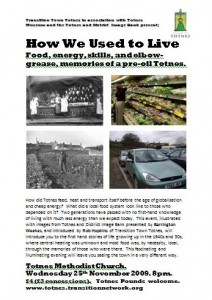 We had a great event last week in Totnes, called ‘How We Used to Live’, which explored the most recent period in history when the town had a more localised economy and less energy than it does today. It was built on the oral history work that I have been doing, which will feature in the Totnes EDAP when it comes out. The evening featured Barrington Weekes from the wonderful Totnes Image Bank and Rural Archive, and four of the people I interviewed. Two of them, Douglas Matthews and Ian Slatter, have since passed away, and the evening was dedicated to their memory.
We had a great event last week in Totnes, called ‘How We Used to Live’, which explored the most recent period in history when the town had a more localised economy and less energy than it does today. It was built on the oral history work that I have been doing, which will feature in the Totnes EDAP when it comes out. The evening featured Barrington Weekes from the wonderful Totnes Image Bank and Rural Archive, and four of the people I interviewed. Two of them, Douglas Matthews and Ian Slatter, have since passed away, and the evening was dedicated to their memory.
Read more»
10 Jul 2009
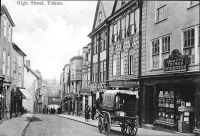 Clearly the markets weren’t the only source of food. The High Street contained a far higher proportion of shops selling food than today. The way the shops were run was very different to today. ML describes a trip to the shops in the early 1950s;
Clearly the markets weren’t the only source of food. The High Street contained a far higher proportion of shops selling food than today. The way the shops were run was very different to today. ML describes a trip to the shops in the early 1950s;
“I used to go to the grocers and I could sit down, lovely. They’d go through your list and say, “yes, yes, we’ve some new whatever it is, would you like to taste some?” You’d have a little snippet of cheese or something, “great, yes, we’ll have that”. “Now we’ve got a tin of broken biscuits, but they’re not too bad (half price you see), would you like them?” As soon as you put a biscuit in your mouth it’s broken isn’t it! Then they’d say “now Mrs. L, you’re going to the butchers, yes, yes, and going to get some fish? Yes, yes, and paraffin? Yes, yes… and they used to say to me now bring any parcels in, we’ll put it in the box with your groceries and bring the lot up for you. And they did. They’d come and deliver and you’d go through it and say that’s fine and would you like a cup of tea….”
Read more»
8 Jul 2009
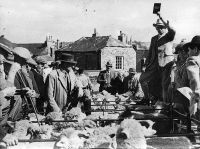 The farmers who surrounded Totnes were much more directly engaged with the town than they are now, as the town provided the key markets for their produce. DM farmed 250 acres (which had grown to 300 by the time of his retirement in 1989). When he started work on the farm, it was still run by working horses. The farm had around 30 cows, 40 acres of cereals and about 50 breeding ewes, but by the time he had retired, it had been turned into a purely dairy farm, with nearly 80 cows.
The farmers who surrounded Totnes were much more directly engaged with the town than they are now, as the town provided the key markets for their produce. DM farmed 250 acres (which had grown to 300 by the time of his retirement in 1989). When he started work on the farm, it was still run by working horses. The farm had around 30 cows, 40 acres of cereals and about 50 breeding ewes, but by the time he had retired, it had been turned into a purely dairy farm, with nearly 80 cows.
Read more»
8 Jul 2009
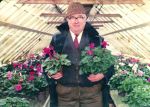 Totnes featured 3 commercial market gardens within the town itself, Heaths, Gills and Phillips/Victoria Nursery. The largest, at least initially, was Heath’s, started in 1920 by George Heath senior (see left), and then run by his son, also called George, until its closure in 1981. Much of the south-facing area of the town has been dedicated to food production back through history, and the gardens serve as a powerful reminder of the potential of urban market gardening.
Totnes featured 3 commercial market gardens within the town itself, Heaths, Gills and Phillips/Victoria Nursery. The largest, at least initially, was Heath’s, started in 1920 by George Heath senior (see left), and then run by his son, also called George, until its closure in 1981. Much of the south-facing area of the town has been dedicated to food production back through history, and the gardens serve as a powerful reminder of the potential of urban market gardening.
Read more»
7 Jul 2009
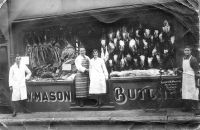 Over the next few days I will be sharing some of the output from the oral histories I have been doing in Totnes and its surroundings, as which will make up part of the introduction to the EDAP and also part of my research. I did about 15 interviews, and have condensed the outputs from them into subject areas such as food, skills, energy, transport and so on. The period covered is from the 1930s until the early 1960s. Interviews were recorded and transcribed. Images are courtesy of the Totnes Image Bank, to whom I am very grateful.
Over the next few days I will be sharing some of the output from the oral histories I have been doing in Totnes and its surroundings, as which will make up part of the introduction to the EDAP and also part of my research. I did about 15 interviews, and have condensed the outputs from them into subject areas such as food, skills, energy, transport and so on. The period covered is from the 1930s until the early 1960s. Interviews were recorded and transcribed. Images are courtesy of the Totnes Image Bank, to whom I am very grateful.
Read more»
 We had a great event last week in Totnes, called ‘How We Used to Live’, which explored the most recent period in history when the town had a more localised economy and less energy than it does today. It was built on the oral history work that I have been doing, which will feature in the Totnes EDAP when it comes out. The evening featured Barrington Weekes from the wonderful Totnes Image Bank and Rural Archive, and four of the people I interviewed. Two of them, Douglas Matthews and Ian Slatter, have since passed away, and the evening was dedicated to their memory.
We had a great event last week in Totnes, called ‘How We Used to Live’, which explored the most recent period in history when the town had a more localised economy and less energy than it does today. It was built on the oral history work that I have been doing, which will feature in the Totnes EDAP when it comes out. The evening featured Barrington Weekes from the wonderful Totnes Image Bank and Rural Archive, and four of the people I interviewed. Two of them, Douglas Matthews and Ian Slatter, have since passed away, and the evening was dedicated to their memory.




